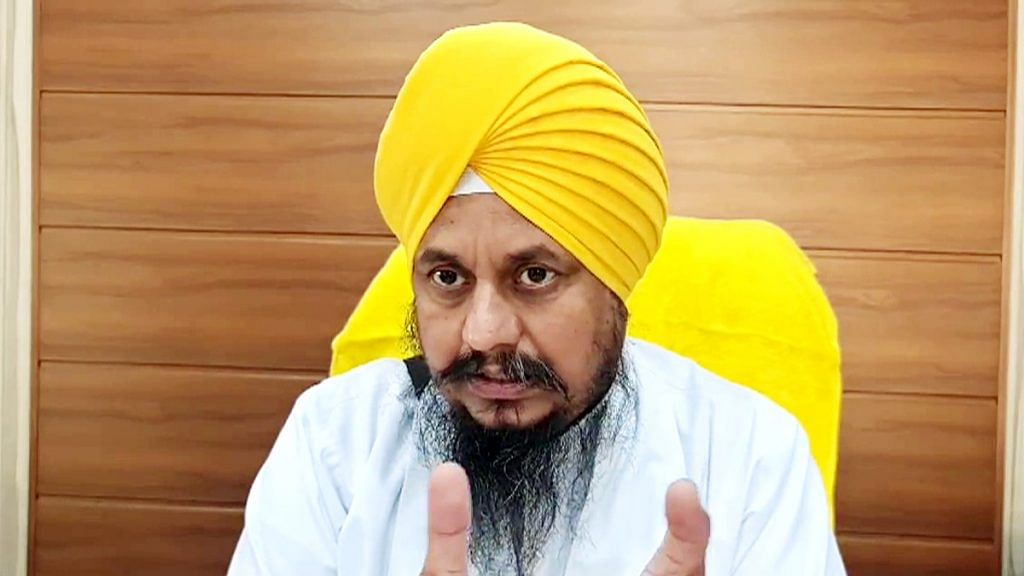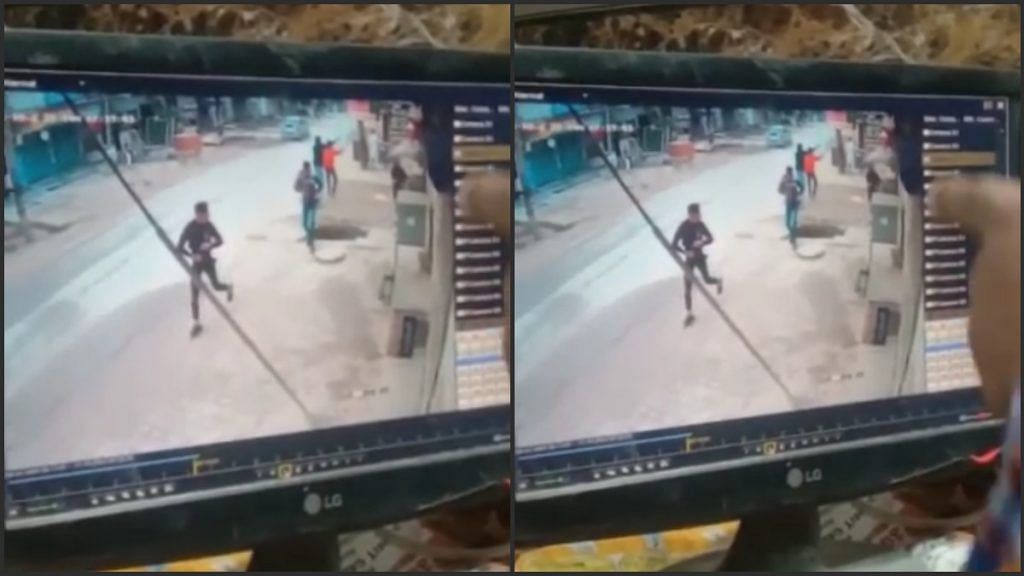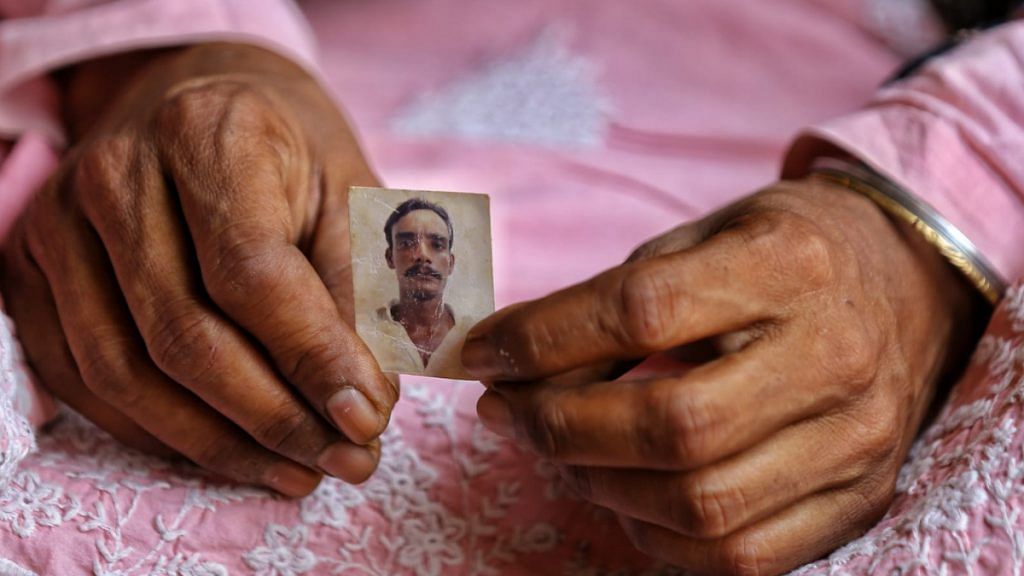Chandigarh: Footage from a CCTV camera shows a tall young man in a red T-shirt purportedly walking into Dukhniwaran Sahib Gurdwara in Punjab’s Rajpura, appearing disoriented. Moments later, he is whisked away to another room by a small group of Sikh devotees. Mobile footage, said to have been taken later that day, shows the same man mumbling as he lies bloodied on the ground.
These images, widely circulated on social media, are said to be of a man called Sahil, who was allegedly severely beaten last week for twice entering the Rajpura Gurdwara with shoes on and without covering his head— acts considered sacrilegious by Sikhs.
Sahil has since been arrested under suspicion of committing sacrilege, but his family members say he was battling depression and undergoing treatment at a Patiala hospital.
“Before these people started beating up my son, was it not their duty to at least ask him what he was doing there?” Sahil’s mother said, speaking to mediapersons.
“When he was not able to give an answer, they should have handed him over to the police and they would have decided whether he did something wrong. But here, without knowing anything, people started beating him up,” she added.
The accused’s brother Sagar told reporters last Tuesday, the day of the incident, that Sahil had likely wandered into the gurdwara in a state of depression, not fully aware of his surroundings.
He added that his family visited the same gurdwara regularly, contributed to the langar, and did sewa. He questioned why nobody had thought to find out what was driving Sahil’s behaviour.
But while Sahil got away with his life, others accused of “sacrilege” have not been so fortunate.
On 14 May, just a couple of days before the Rajpura incident, a middle-aged woman called Kulwinder Kaur (initially identified as Parvinder Kaur) was allegedly spotted consuming alcohol inside the complex of the Gurdwara Dukhniwaran Sahib in Patiala.
After she was confronted for committing sacrilege, she was handed over to the police. While they were removing her from the scene, an enraged devotee brought out a gun. He fired five bullets, killing Kulwinder and injuring another devotee. The alleged killer Nirmaljit Singh Saini was arrested on the spot.
As for Kulwinder Kaur, Patiala police told mediapersons that she was divorced, worked at a salon at Zirakpur, and was undergoing treatment for alcohol abuse at a de-addiction centre. They refused to divulge further details lest her family members also become targets.
The woman’s body was cremated by the police after her family identified her, Patiala police told ThePrint.
Meanwhile, accused Nirmaljit Singh’s act of administering ‘instant justice’ for the alleged sacrilege received recognition from the Shiromani Gurdwara Prabandhak Committee (SGPC), the governing body of gurdwaras in Punjab, and his parents were bestowed with a siropa or robe of honour.
Parents of Nirmaljit Singh Saini, honoured with Siropa (robe of honour) by Giani Pritpal Singh, head granthi of Gurdwara Dukhniwaran Sahib, Patiala, accompanied by @SGPCAmritsar members Jarnail Singh Kartarpur & Satwinder Singh Tohra. pic.twitter.com/e3kvw4RobS
— Jaskaran Singh (@JKSinghCH) May 15, 2023
The SGPC also announced that Nirmaljit will be provided free legal aid to fight the murder case. On the day he was produced in the court, many Sikhs gathered and showered him with flowers.
Speaking to ThePrint, Dr. Manjit Singh, a former professor in the department of sociology at Panjab University, Chandigarh, said there has been a rise in incidents of people trying to dispense ‘justice’ on the spot in sacrilege cases.
“This has largely to do with the feeling that the police and the government do not deal harshly enough with the accused in sacrilege cases and allow them to go scot-free,” Prof Singh explained.
He also voiced serious concerns about the trend.
“These acts of instant justice will only harm the Sikh religion in the long run. Guru Nanak Dev Ji, the first Guru of the Sikhs, promoted dialogue. But now there is an intolerant radical element emerging among Sikhs,” he said.
Here is a look at some high-profile sacrilege cases and why vigilante ‘justice’ seems to have become the default reaction in such instances.
Also Read: What is ‘beadbi’ or sacrilege in Sikhism, which sees Guru Granth Sahib as living Guru
Conspiracy theories, deadly outcomes
Following the shooting death of Kulwinder Kaur last week, SGPC president Harjinder Singh Dhami claimed that various acts of sacrilege were part of a larger anti-Sikh conspiracy.
“If exemplary action is taken against the accused, no one will dare to commit such acts. Such incidents will not happen if the government is serious and fulfils its responsibilities,” he said.
Meanwhile, BJP state vice-president Arvind Khanna criticised Dhami’s interpretation.
The act of sacrilege in Patiala’s Gurdwara Dukhniwaran Sahib was “deeply painful”, he tweeted, but added it was “even more painful” that Dhami was giving the incident a political and communal colour.
“Dhami Sahab is terming this incident a conspiracy despite the fact that (the) culprit was mentally unstable,” he said.
The act of sacrilege in Gurdwara Dukh Niwaran Sahib is deeply painful but more painful is to see Harjinder Singh Dhami Ji giving a political colour to this unfortunate incident.
Punjab has seen enough dark time when religious leaders tried to communalise every issue.
Dhami… pic.twitter.com/2MfXgHnV0d
— Arvind Khanna (@arvindkhannaoff) May 15, 2023
The two incidents this month come close on the heels of another case of sacrilege in Rupnagar district’s Morinda in April. That instance, too, led to allegations of a wider conspiracy from Sikh spiritual leaders.
On 24 April, Jasbir Singh Jassi, a resident of Morinda, allegedly desecrated the Guru Granth Sahib and hit the granthis at the town’s historic Kotwali Sahib Gurdwara.
He was overpowered by the devotees, beaten up, and dragged into a room in the gurdwara until he was handed over to the police. But that was not the end of it.
Subsequently, hundreds of Sikh men surrounded the Morinda police station, demanding that the accused be handed over to them so that they could deliver “instant justice”.
When the police did not comply, the agitated crowd went to Jasbir’s house and vandalised it even as his family went into hiding.
On 28 April, when Jasbir was produced before a court in Ropar, a lawyer identified as Sahib Singh tried to shoot him. On 1 May, Jasbir complained of chest pain and was rushed to hospital where he died.
Jasbir Singh’s family is yet to return to their ransacked house in Morinda fearing for their lives, according to the police.
Meanwhile, Giani Harpreet Singh, the Jathedar of the Akal Takht, the highest temporal body of the Sikhs, had claimed after the Morinda incident that “some bigger forces” seemed to be at play.

In a video message, the Akal Takht Jathedar also said that when Sikhs reacted after their religious sentiments were hurt, they “blamed for disturbing the peace”, adding that “had the culprits of previous sacrilege acts been given exemplary punishment’, such incidents would not have continued.”
This statement, according to Prof Manjit Singh, reflects the “overarching sentiment” of Sikh devotees and onlookers who take matters into their own hands when dealing with individuals they believe have committed sacrilege.
“The Sikhs consider the Guru Granth Sahib to be a living Guru. In addition to the gurdwara, which is the abode of the Guru Granth Sahib, everything associated with the Guru, including its symbols, is sacred to the Sikhs. Any disrespect shown towards the Guru, gurdwara, or its symbols provokes strong reactions from Sikh devotees,” the professor told ThePrint.
He added that, in the past, those who committed sacrilege were typically handed over to the police by the Gurdwara management, but there has been an uptick in cases of vigilantism for immediate ‘justice’ in recent years.
Punjab, notably, has the highest number of cases related to “religious offences” registered in the country, according to the ‘Crime in India 2021’, the latest report released by the National Crime Records Bureau (NCRB).
Offenses related to religion come under sections 295 (injuring or defiling a place of worship), 296 (disturbing religious assembly), and 297 (trespassing on burial places of the Indian Penal Code.
Punjab’s crime rate— or cases per lakh of the population— for religious offences stands at 0.6 percent, followed by Goa at 0.5 per cent, and Karnataka, Madhya Pradesh, and Haryana at 0.3 per cent. The overall crime rate for religious offences in India is 0.1 percent.
Roots in Faridkot case of 2015
In June 2015, a bir (physical copy) Guru Granth Sahib was stolen from the gurdwara of a Faridkot village and its pages torn and strewn in a nearby location. Most of the accused were later found to be followers of the Dera Sacha Sauda, a sect headed by controversial preacher Gurmit Ram Rahim.
The Faridkot case triggered widespread and long-lasting anger at the police and the then Akali-led government for not taking quick and decisive action in desecration cases.
“In Punjab, ever since the Faridkot sacrilege case of 2015–which was seen as having been first botched up by multiple SITs (special investigation teams) of the Punjab police and later by the CBI– impatience with the law in giving justice to desecration accused has increased,” noted Prof Manjit Singh.
Four of the over two dozen accused in the Faridkot sacrilege case have since been murdered even while the case is in an advanced stage of court proceedings.
On 10 November last year, 36-year-old Pardeep Singh alias Raju Dhodhi, also known as Raju Dhodhi, a follower of Dera Sacha Sauda, was fatally shot by six motorcycle-borne men in Kotkapura. Pardeep was among the accused in the Faridkot sacrilege case and was killed while opening his shop in the morning, despite having government security cover.

Canada-based gangster Satwinderjit Singh alias Goldy Brar took responsibility for the murder, claiming that it was an act of retribution for the sacrilege. Sixteen members of Brar’s gang have been arrested in connection with the case, which is currently being tried in court.
The prime accused in the Faridkot incident, Mohinderpal Bittu, a state committee member of the Dera Sacha Sauda, was murdered in June 2019 while incarcerated in Nabha jail. Bittu had been arrested in 2018 for his involvement in the case.
The suspected killers, Gursewak Singh, alias Bhoot, and Maninder Singh, alias Jammu, who were serving prison sentences for another murder, allegedly used iron rods to carry out the killing. The case is currently being tried in a Patiala court.
Another Dera follower, Gurdev Singh, who was allegedly involved in the Faridkot incident, was murdered in June 2016. He was attacked by three persons who entered his shop in Faridkot. Last February, Gurpreet Singh, alias Gopi, Ashok Kumar Vohra, alias Amna, and Jaswant Singh, alias Kala, were convicted for the killing.
In November 2020, Manohar Lal, the father of another accused in the case, Jatinderpal, alias Jimmy, was murdered in a village in Bathinda. In 2021, the police arrested two alleged members of the Khalistan Tiger Force and an alleged sharpshooter in connection with the killing.
A spate of lynching cases
In December 2021, dera follower Charan Dass of Muktsar’s Bhunder village was killed for his alleged involvement in a different case of desecration of 2018. Villagers claimed to have witnessed Charan Dass and his sister picking up the Guru Granth Sahib, leading to his arrest. He was out on bail when he was killed.
Another incident of “on the spot justice” for an alleged act of sacrilege made national headlines during the farmer’s agitation at the Singhu border in October 2021.
Lakhbir Singh, a 35-year-old Dalit Sikh from Tarn Taran, was brutally lynched and strung up on a barricade, allegedly by Nihang Singhs. Lakhbir Singh was accused of desecrating the Sarbloh Granth, a Sikh holy book.
His killers subjected him to severe violence before his death, including chopping off his arms and breaking his legs, before killing him. Four Nihang Sikhs, namely Sarabjit Singh, Narain Singh, Bhagwant Singh, and Govind Preet Singh, were arrested for his murder. The four were honoured with siropas by other Nihangs before the police took them into custody.

Sikh preacher Ranjit Singh Dhadrianwale, however, had vociferously condemned the killing.
A few months later, in December 2021, an unidentified man was lynched in Amritsar for allegedly trying to desecrate the Guru Granth Sahib at the Golden Temple. The man jumped over the railing that divides the sanctum sanctorum and tried to reach out for a kirpan.
He was thrashed by the SGPC staff and later handed over to enraged devotees who beat him to death. He remains unidentified to date. No one from the crowd that killed him was booked.
Within days of the incident at the Golden Temple, another unidentified youth was killed for suspected theft and ‘sacrilege’ at a village gurdwara in Kapurthala.
The granthi (ceremonial reader of the Guru Granth Sahib) of the gurdwara Amarjit Singh first caught the unidentified youth and locked him in a room.
He then used social media to spread information about the incident and called a Sikh Sangat, or congregational gathering, at the gurdwara. Although an SGPC member reportedly suggested handing the youth over to the police since his behaviour seemed “abnormal”, the gathered individuals refused. They then entered the room where the young man was locked and killed him.
In their investigation, the police found that the youth, who is still unidentified, had entered the Gurdwara with the intention of stealing food and not committing sacrilege. The police registered a case against granthi Amarjeet Singh and over a hundred unknown persons. The granthi is currently in jail at Gurdaspur.
Notably, Barjinder Singh Parwana, head of the Damdami Taksal Jatha was later accused in the Kapurthala case for instigating the crowd to turn violent.
Parwana is the prime accused in the violent clashes that took place last May in Patiala over an anti-Khalistan march. He was arrested in May 2022, but got bail in December.
‘Their truth never comes out’
This Wednesday, soon after Sahil was attacked at the Rajpura Gurdwara, Barjinder Singh Parwana released a video message on social media. He “informed” his followers that the young man had been severely beaten and meted out treatment he would never forget.
“Let us see if he survives this beating or not,” Parwana says in the video message.
According to Prof Manjit Singh, there is a prevailing sentiment among Sikhs that the police let off those accused of sacrilege by claiming they were mentally unstable and thus unaware of their actions.
“That a mentally upset person could have committed the sacrilege has stopped cutting ice with the enraged crowds,” he said. “After the Rajpura incident, I heard one of the persons in the crowd telling a news reporter that if a person is mentally upset or is undergoing treatment for depression why does he or she come to a gurdwara? Why do they never enter temples or create problems at home?”
Prof Singh pointed out that this approach leaves little room to ascertain the facts.
“The problem is that the accused is killed on the spot,” he said. “Their truth never comes out.”
(Edited by Asavari Singh)
Also Read: ‘He didn’t go out alone, only had Rs 100’: Lynched Sikh’s kin in Punjab find Singhu trip ‘fishy’



